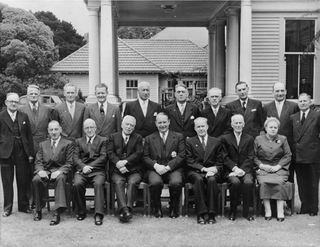Related Research Articles
Tax noncompliance is a range of activities that are unfavorable to a government's tax system. This may include tax avoidance, which is tax reduction by legal means, and tax evasion which is the illegal non-payment of tax liabilities. The use of the term "noncompliance" is used differently by different authors. Its most general use describes non-compliant behaviors with respect to different institutional rules resulting in what Edgar L. Feige calls unobserved economies. Non-compliance with fiscal rules of taxation gives rise to unreported income and a tax gap that Feige estimates to be in the neighborhood of $500 billion annually for the United States.

Metiria Leanne Agnes Stanton Turei is a New Zealand academic and former politician. She was a Member of Parliament from 2002 to 2017 and the female co-leader of the Green Party of Aotearoa New Zealand from 2009 to 2017. Turei resigned from the co-leader position on 9 August 2017 amid a political controversy arising from her admission to lying to the Ministry of Social Development to receive higher payments when she was on the Domestic Purposes Benefit and later, to being enrolled to vote in an electorate where she was not eligible when she was 23.
Kenneth Lex Shirley is a former New Zealand politician. He was a member of the ACT New Zealand party, although was previously a member and Cabinet minister of the Labour Party.

John Gary Blincoe is a former New Zealand politician. He was an MP from 1990 to 1996, representing the Labour Party.
Benefit fraud is a form of welfare fraud as found within the system of government benefits paid to individuals by the welfare state in the United Kingdom.
Affinity fraud is a form of investment fraud in which the fraudster preys upon members of identifiable groups, such as religious or ethnic communities, language minorities, the elderly, or professional groups. The fraudsters who promote affinity scams frequently are – or successfully pretend to be – members of the group. They often enlist respected community or religious leaders from within the group to spread the word about the scheme, by convincing those people that a fraudulent investment is legitimate and worthwhile. Many times, those leaders become unwitting victims of the fraudster's ruse.
Superannuation in Australia, or "super", is a savings system for workplace pensions in retirement. It involves money earned by an employee being placed into an investment fund to be made legally available to members upon retirement. Employers make compulsory payments to these funds at a proportion of their employee's wages. From July 2024, the mandatory minimum "guarantee" contribution is 11.5%, rising to 12% from 2025. The superannuation guarantee was introduced by the Hawke government to promote self-funded retirement savings, reducing reliance on a publicly funded pension system. Legislation to support the introduction of the superannuation guarantee was passed by the Keating Government in 1992.

Taxes in New Zealand are collected at a national level by the Inland Revenue Department (IRD) on behalf of the New Zealand Government. National taxes are levied on personal and business income, and on the supply of goods and services. Capital gains tax applies in limited situations, such as the sale of some rental properties within 10 years of purchase. Some "gains" such as profits on the sale of patent rights are deemed to be income – income tax does apply to property transactions in certain circumstances, particularly speculation. There are currently no land taxes, but local property taxes (rates) are managed and collected by local authorities. Some goods and services carry a specific tax, referred to as an excise or a duty, such as alcohol excise or gaming duty. These are collected by a range of government agencies such as the New Zealand Customs Service. There is no social security (payroll) tax.

The Commission of Inquiry into Certain Matters Relating to Taxation, popularly known as the Winebox Inquiry, was an inquiry undertaken in New Zealand to investigate claims of corruption and incompetence in the Serious Fraud Office (SFO) and Inland Revenue Department (IRD).

KiwiSaver is a New Zealand savings scheme which has been operating since 2 July 2007. Participants can normally access their KiwiSaver funds only after the age of 65, but can withdraw them earlier in certain limited circumstances, for example if undergoing significant financial hardship or to use a deposit for a first home.

Social welfare has long been an important part of New Zealand society and a significant political issue. It is concerned with the provision by the state of benefits and services. Together with fiscal welfare and occupational welfare, it makes up the social policy of New Zealand. Social welfare is mostly funded through general taxation. Since the 1980s welfare has been provided on the basis of need; the exception is universal superannuation.

The Third Labour Government of New Zealand was the government of New Zealand from 1972 to 1975. During its time in office, it carried out a wide range of reforms in areas such as overseas trade, farming, public works, energy generation, local government, health, the arts, sport and recreation, regional development, environmental protection, education, housing, and social welfare. Māori also benefited from revisions to the laws relating to land, together with a significant increase in a Māori and Island Affairs building programme. In addition, the government encouraged biculturalism and a sense of New Zealand identity. However, the government damaged relations between Pākehā and Pasifika New Zealanders by instituting the Dawn Raids on alleged overstayers from the Pacific Islands; the raids have been described as "the most blatantly racist attack on Pacific peoples by the New Zealand government in New Zealand’s history". The government lasted for one term before being defeated a year after the death of its popular leader, Norman Kirk.

The Second Labour Government of New Zealand was the government of New Zealand from 1957 to 1960. It was most notable for raising taxes on alcohol, cigarettes and petrol, a move which was probably responsible for the government lasting for only one term. It was headed by the Prime Minister Walter Nash.

Hell Pizza is a New Zealand–based pizza chain. It was established in Wellington in 1996 and has since expanded around New Zealand.

The 2017 New Zealand general election took place on Saturday 23 September 2017 to determine the membership of the 52nd New Zealand Parliament. The previous parliament was elected on 20 September 2014 and was officially dissolved on 22 August 2017. Voters elected 120 members to the House of Representatives under New Zealand's mixed-member proportional (MMP) voting system, a proportional representation system in which 71 members were elected from single-member electorates and 49 members were elected from closed party lists. Around 3.57 million people were registered to vote in the election, with 2.63 million (79.8%) turning out. Advance voting proved popular, with 1.24 million votes cast before election day, more than the previous two elections combined.
Claudia Geiringer is a New Zealand professor of law. In 2022 she was elected a Fellow of the Royal Society Te Apārangi.

Welfare fraud is the act of illegally using state welfare systems by knowingly withholding or giving information to obtain more funds than would otherwise be allocated.

Nicola Valentine Willis is a New Zealand politician who is currently deputy leader of the National Party and minister of Finance in a coalition government with ACT and New Zealand First. Willis entered the New Zealand Parliament in 2018, when she inherited Steven Joyce's seat in Parliament as the next on the party list after his retirement from politics.
The Tax Working Group is an advisory body that was created by the New Zealand Government in late 2017 to investigate ways of reforming New Zealand's taxation system and making it "fairer." Some key areas under its purview include the Goods and Services Tax and alleviating the housing market. The Working Group is headed by former Finance Minister Sir Michael Cullen.

The Joint Chiefs of Global Tax Enforcement (J5) is a global joint operational group, formed in mid-2018 to combat transnational tax crime. Composed of the Australian Taxation Office (ATO), the Canada Revenue Agency (CRA), the Dutch Fiscale Inlichtingen- en Opsporingsdienst (FIOD), the British His Majesty's Revenue and Customs (HMRC), and the American IRS Criminal Investigation (IRS-CI), the J5 members work together to gather information, share intelligence, conduct operations and build the capacity of tax crime enforcement officials.
References
- 1 2 3 "Lisa Marriott – Victoria Professional and Executive Development". ped.victoria.ac.nz.
- ↑ Marriott, Lisa (2008). The Politics of Retirement Savings Taxation: a Trans-Tasman Comparison (Doctoral thesis). Open Access Repository Victoria University of Wellington, Victoria University of Wellington. doi: 10.26686/wgtn.16934761 .
- ↑ "Congratulations to Dr Lisa Marriott who has received a Fast Start Marsden grant – School of Accounting and Commercial Law – Victoria University of Wellington". www.victoria.ac.nz. 25 October 2012.
- ↑ Wellington, Victoria University of (31 May 2016). "Equal treatment?".
- ↑ "Why is tax evasion treated more gently than benefit fraud?". 13 August 2017.
- ↑ "Guest lecture – Lisa Marriott – White-Collar and Blue-Collar Financial Crime in New Zealand – The Treasury New Zealand". treasury.govt.nz.
- ↑ "The hypocrisy of NZ's approach to fraud". newsroom.co.nz. 3 May 2017.
- ↑ "Research shows state far more lenient on tax evasion than welfare fraud". Newshub . 23 July 2017 – via www.newshub.co.nz.
- ↑ "Lisa Marriott to Deliver 2016 Bruce Jesson Lecture". 3 September 2016.
- ↑ "Unite Union – Tax professor calls for independent inquiry into how tax evaders and benefit fraudsters are treated by the justice system – Unite Union".
- ↑ "Courts softer on criminals wearing suits". Stuff.
- ↑ staff, Newstalk ZB. "Lisa Marriott: Welfare fraudsters targeted more frequently than tax evaders".